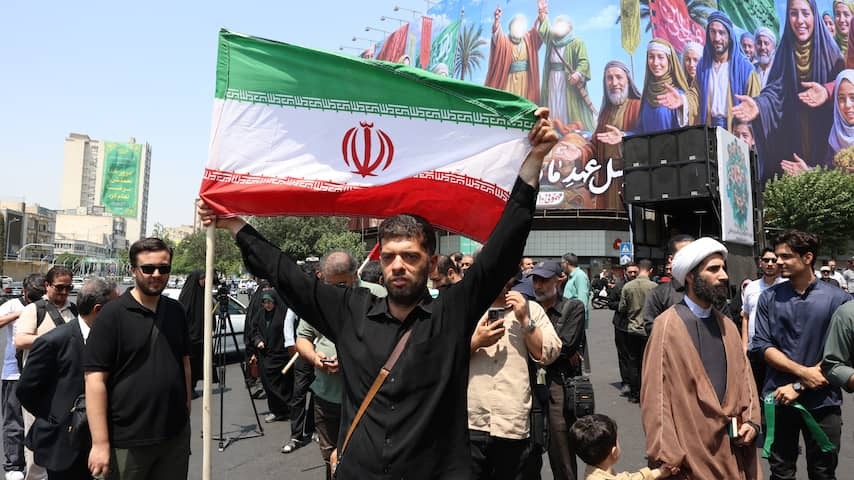
With an attack on Iranian nuclear facilities, Israel hopes to end the nuclear ambitions of its arch-rival. But experts also see personal motives in Prime Minister Benjamin Netanyahu. “His support is crumbling and he needed this.”
With two hundred fighter jets, Israel bombarded Iranian targets on Thursday night, including nuclear facilities. This is a significant escalation. Iran considers the attacks a declaration of war. In previous attacks, such as the one in October 2024, no nuclear facilities were hit.
This attack had been “bubbling” for a while, says Noa Schonmann, Middle East expert at Leiden University, to NU.nl. So she is not surprised. “This has been Netanyahu’s number one goal throughout his premiership.” For years, he has warned of a scenario in which Iran develops a nuclear bomb with which it can wipe Israel off the map.
“Israel is the only nuclear power in the region and wants to remain so,” says Berber van der Woude, former diplomat in Ramallah and now chairman of knowledge center The Rights Forum. “Israel feels threatened when Iran is also working on it. The country wants sole control in the region when it comes to nuclear power.”
The threat from Iran had increased recently. On Thursday, the International Atomic Energy Agency (IAEA) reprimanded the country for not fulfilling its nuclear obligations. As a counter-reaction, Iran announced the opening of a new facility.
Political ambitions of Netanyahu also in play
But there is more: according to Schonmann – herself Israeli – there are also political ambitions of Netanyahu in play. She refers to a scenario in which the Israeli cabinet falls and new elections are held. That could happen this year.
“If Netanyahu wants any chance then, he needed this attack – from his perspective anyway,” she says. With such an attack, and an inevitable counter-attack, he wants to show that the Iranian threat is real and that he does not shy away from defending Israel. In that respect, it was now or never for the Israeli Prime Minister.
The conflict with Iran cannot be seen separately from the war in Gaza and the broader tensions in the Middle East. Everything changed according to Schonmann on October 7, 2023, when Hamas attacked Israel. “It triggered everything that followed.” Israel had to redefine its relationship with all kinds of threats in the region. “There were attacks on Hezbollah in Lebanon, the Houthi rebels in Yemen, Syria, and also Iran.”
In short: October 7 paved the way for everything Netanyahu wanted to do, where he previously hesitated. Because within the chaos that already exists, it becomes easier to add new goals, according to Schonmann. Whether that is positive or negative depends on who you ask, according to the expert. “His supporters believe that Netanyahu is laying the foundation for the security of Israel in the coming century. The more cynical interpretation is that it’s all about his political survival.”
Attack was carefully prepared
In recent years, Israel has already done a few things to thwart Iran’s nuclear program, Schonmann states. For example, researchers were murdered and computer viruses were installed. The attack last night was probably set up in recent weeks. “Israeli drones and vehicles were smuggled into Iran. They were used at night to kill high-ranking people and disable air defenses.” After the chaos that caused, the two hundred fighter jets could do their job.
Looking at Iran’s position with a ‘rational lens’
Netanyahu is also thinking about his image at the international level, says former diplomat Van der Woude. “Due to the genocide in Gaza, support for Israel is starting to crumble. With this attack, he emphasizes the image that Israel is being attacked from all sides. He then uses that as a legitimization for the use of aggression.” Van der Woude had previously been critical of the Israeli actions in Gaza, including in NRC.
Whether Netanyahu gets the international support he hopes for remains to be seen. The Netherlands regrets the Israeli actions, outgoing Minister of Defense Ruben Brekelmans said. Concerned reactions are also heard elsewhere in the world. EU foreign policy chief Kaja Kallas calls the situation “dangerous”.
Van der Woude points out that we must also dare to look at Iran’s position with a “rational lens”. “Because for Iran, Israel is just as big a threat as vice versa,” she says. “Last night’s attack proves that. Iran must also do something with that geopolitical uncertainty.”
Foreign correspondent Matthijs le Loux on the role of the US
US President Donald Trump asked Netanyahu by telephone on Monday not to attack Iran. He repeated that message publicly on Thursday, hours before the attacks. The White House expected Israel to wait while the US negotiated a new nuclear deal with Iran. Many experts think it is unlikely that Trump sold the Israeli Prime Minister a hard no.
The White House emphasized that it played no role in the “unilateral” Israeli attack, but was informed in advance. Trump says he didn’t know about the plan when his government ordered the evacuation of non-essential personnel from US embassies in the Middle East on Wednesday.
That step did spark speculation that something would actually happen, plus the question of whether the US also meant that as a signal to Tehran that a deal had to come soon. Either way, Trump warned Iran on Friday that Israel is getting a lot of advanced American weapons. “Iran must make a deal, before there is nothing left,” he wrote on Truth Social.
Democratic Senator Chris Murphy stated on Friday that the Israeli attack “was clearly intended to sabotage negotiations between the Trump administration and Iran.”